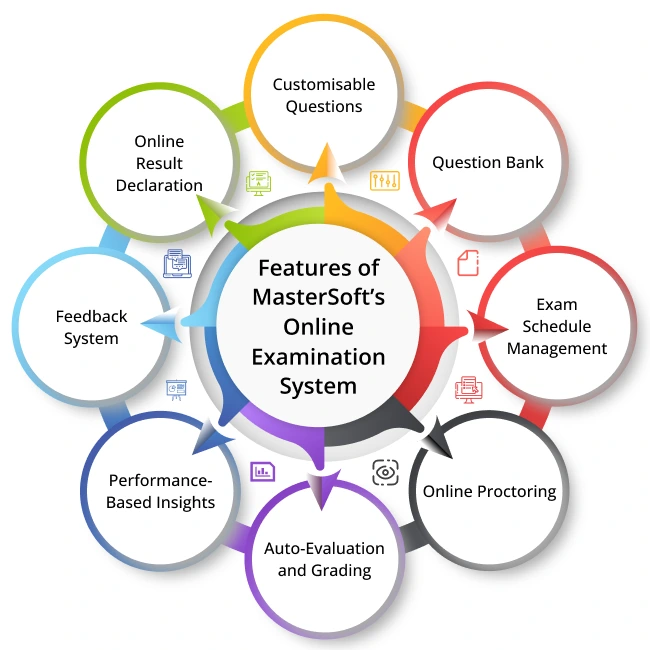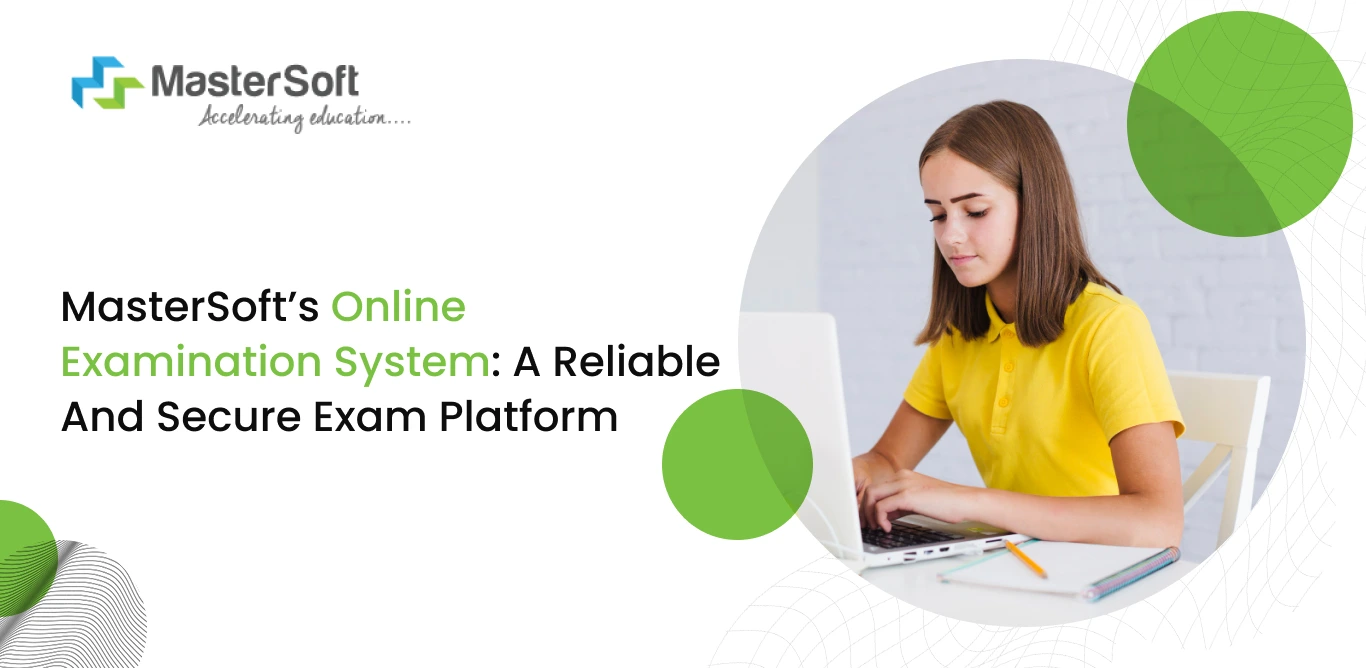07, Oct 2024
The effectiveness of an examination system relies on how well it can evaluate student learning and knowledge levels. Hence, moving beyond outdated assessment methods is the need of the hour, especially to assess students’ overall understanding and growth.
An ideal solution lies in incorporating online exams to determine learners’ ongoing progress and recurrent academic issues. That is why institutes need a robust online exam platform that helps to conduct different kinds of examinations.
But are online exams as effective as traditional examinations? How does it measure student learning? Let’s find out:
Significance of Online Examinations
Online exams are digitalised evaluation methods that institutes and teachers implement through online examination platforms. It has gained increased significance over the years because it provides teachers with different ways to assess students.
Irrespective of location, students can take the test if they have an internet connection and a computer or laptop. Furthermore, teachers can customise exam questions depending on the students’ comprehension and knowledge levels.
Furthermore, advanced tools like MasterSoft’s online examination system can accommodate students with disabilities through advanced features like speech-to-text, screen readers, and extended time. Additionally, teachers can include different kinds of questions, enabling them to assess student learning accurately.
Therefore, it is only fitting to take a look at the essential features of the online exam platform and how it helps to establish an effective evaluation mechanism:

Features of MasterSoft’s Online Examination System
Customisable Questions
The traditional examination offers a limited scope for adding varied questions, whereas teachers can use different types of questions in online assessments. They can include the following questions, depending on the subject or content:
- Short Question and Answer: It requires students to provide brief responses.
- Multiple Choice Questions (MCQs): This requires students to pick the right answer from a few given options.
- Descriptive Questions: It requires students to provide in-depth explanations.
- Essay: It requires students to present their point of view on a particular topic while citing various instances.
- Fill-in-the-blanks: It requires students to fill in the correct words or phrases.
Employing varied questions in examinations makes it difficult to cheat or copy answers, encouraging students to rely on their knowledge. Besides, it is an effective technique to measure cognitive skills (knowledge, comprehension, application, analysis, synthesis, and evaluation).
MasterSoft’s Proctoring: Preventing Malpractices In Online Exams
Question Bank
Question banks are one of the primary components of the platform through which teachers can administer exams. Furthermore, it is a centralised repository of questionnaires that instructors can use for future reference.
The admin can analyse the question bank data to evaluate the effectiveness of instructional and assessment methods and the curriculum.
Exam Schedule Management
Scheduling subject-based and class-wise examinations takes extended time and effort, especially when the admin conducts them manually. However, the online platform enables the admin to create, organise, and track exam schedules effectively.
Teachers can use the application to pre-define the exams that they will conduct; they can establish the exam patterns and types. For instance, they can conduct weekly/monthly examinations and mention the total duration of time and minimum marks essential for passing the test.
On the other hand, the admin and teachers can use the digitalised calendar to automate the scheduling of exams, helping to avoid conflicts. Also, the system can send automated notifications to students and instructors regarding upcoming tests.
Online Proctoring
The possibility of cheating during online tests is high considering that they are in their personal space, allowing them to take advantage of the situation. Therefore, the software comes with built-in AI-proctoring tools, establishing an online examination monitoring system.
Consequently, the remote invigilator or the institute staff can monitor the ongoing student activity throughout the examination through the following features:
- Video Surveillance: The system monitors students through their webcam and captures the surroundings, preventing them from looking at external resources.
- Audio Surveillance: The system tracks the exam-taking candidate’s surroundings for suspicious noises or conversations.
- Browser Restrictions: This prevents students from accessing websites other than the exam portal. Besides, repeated attempts at browsing activity lead to auto-alert messages and gradual termination of the exam.
- Real-time Invigilation: This feature allows an institute-appointed remote invigilator to monitor students in real time, and they can ask the student to share their screens.
Auto-Evaluation and Grading
A common scenario is piles of stacked answer sheets on the teacher’s table and aiming to finish checking them as soon as they complete explaining a topic. Dividing the time between teaching and learning and post-examination activities is labour-intensive and exhausting.
Fortunately, teachers can leverage the software’s auto-evaluation feature, wherein it compares students’ responses to a predetermined answer key. In the next step, the system assigns a score to each question, depending on the comparison, and calculates the overall exam score.
Furthermore, it uses natural language processing techniques for more complex questions’ answers, such as essays. Consequently, it analyses the content, grammar, and structure of the response, reducing the evaluation time and enabling teachers to provide the final, in-depth feedback.
Performance-Based Insights
Identifying individual student progress can be a challenging task, especially due to the lack of effective measures. Hence, teachers can leverage the detailed insights that the online examination system provides to identify improvement areas. For example, some crucial performance-based insights are as follows:
- Question-Level Analysis: This provides a detailed breakdown of correct and incorrect answers and compares students’ performance on questions of varying difficulty levels.
- Progress Tracking: The system identifies trends and areas of improvement based on multiple assessments and exams. Also, it compares students’ current scores to previous scores.
- Diagnostic Reports: These reports help to identify specific areas wherein the students might be struggling, such as subject matter, abstract concepts, etc. At the same time, the system supports integration with LMS software, which can help to personalise lessons and assessments.
Improving Classroom Experience with MasterSoft's LMS
Feedback System
The system enables teachers to provide regular and timely feedback to students, helping them to understand their shortcomings accordingly. In fact, teachers can add comments and annotations directly to the student’s work.
Moreover, they can provide opportunities and suggestions for improvement through personalised feedback. Developing an intervention plan that entails an appropriate course of action, level-based assignments, and assessments is an effective strategy.
In addition, teachers can encourage students to conduct self-assessments, wherein the latter can reflect on their own performance. Likewise, they can help learners set specific academic goals, enabling them to stay on track.
Online Result Declaration
Institutes can leverage the online examination platform to generate and declare results conveniently. It eliminates the time-consuming process through a completely digitalised process, which includes the following steps:
- Instructors can grade the exam papers manually, or they can use the automated grading features to accelerate the task.
- They can enter the results into the platform using the simple interface.
- After verifying the result, the admin can publish the results online, making them available to the students instantly.
Besides, institutes can integrate the application with other tools like student information systems or learning management software to provide a holistic academic experience to students.
Conclusion
Incorporating MasterSoft’s online examination system can benefit institutes by helping them conduct exams in a streamlined manner. Furthermore, it facilitates effective evaluations, detailed insights into student performance, and timely feedback to learners. Therefore, to learn more, feel free to book a free demo now.
Still wondering how NEP 2024 will revolutionise the Indian education system?
Mobile: 08448010216
Email: janki.somani@iitms.co.in













